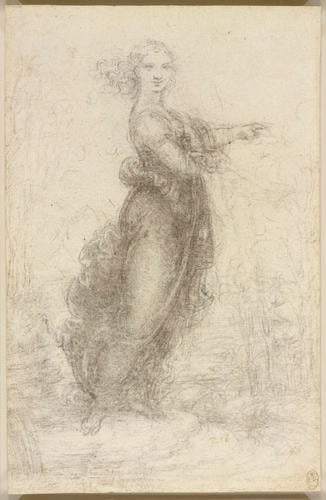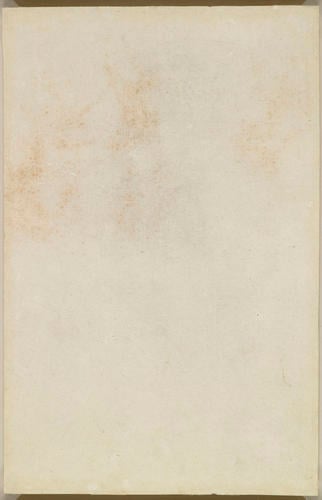-
1 of 253523 objects
A woman in a landscape c.1517-18
Black chalk | 21.0 x 13.5 cm (sheet of paper) | RCIN 912581
-
A drawing of a woman standing in a landscape, with her body turned to the right, and her head turned to face the spectator. She wears full drapery, which blows out behind her in elaborate folds. Her right hand rests on her breast and with her left hand she points into the distance. Melzi's number 216.
The most plausible explanation of this mysterious drawing is that it depicts Matelda, appearing to Dante in Purgatory (Cantos 28–29), the second book of his Divine Comedy: ‘I came upon a stream that blocked / the path of my advance; […] / I halted, and I set my eyes upon / the farther bank, to look at the abundant / variety of newly-flowered boughs; / And there […] / I saw a solitary woman moving, / singing, and gathering up flower on flower. / […] No sooner had she reached the point where that / fair river’s waves could barely bathe the grass, / than she gave me this gift: lifting her eyes. / […] / Erect, along the farther bank, she smiled, / her hands entwining varicoloured flowers.’
The fluttering drapery here echoes that of Matelda in Botticelli’s illustration of the same scene (Berlin, Kupferstichkabinett), though the distinctive pose is derived from a figure in one of Mantegna’s canvases of the Triumph of Caesar, the Bearers of Trophies and Bullion (c.1484–92; Royal Collection, RCIN 403960), perhaps known to Leonardo via a print. The pointing gesture and direct gaze relate the drawing to Leonardo’s compositions of the Angel of the Annunciation (RCIN 912328) and St John the Baptist (Paris, Louvre), and would put us here in the position of Dante, as Matelda indicates her earthly paradise to us. But Leonardo had, it seems, little sustained interest in Dante, and most quotations from the Divine Comedy in his notebooks are on natural phenomena; though the background here is hard to read it seems rocky, and we know from the Leda that Leonardo would not miss an opportunity to illustrate a flowery setting (eg. RCIN 912424). The context and function of the drawing thus remain unknown.
Text adapted from Leonardo da Vinci: A life in drawing, London, 2018Provenance
Bequeathed to Francesco Melzi; from whose heirs purchased by Pompeo Leoni, c.1582-90; Thomas Howard, 14th Earl of Arundel, by 1630; probably acquired by Charles II; Royal Collection by 1690
-
Creator(s)
Acquirer(s)
-
Medium and techniques
Black chalk
Measurements
21.0 x 13.5 cm (sheet of paper)
Category
Object type(s)
Subject(s)

